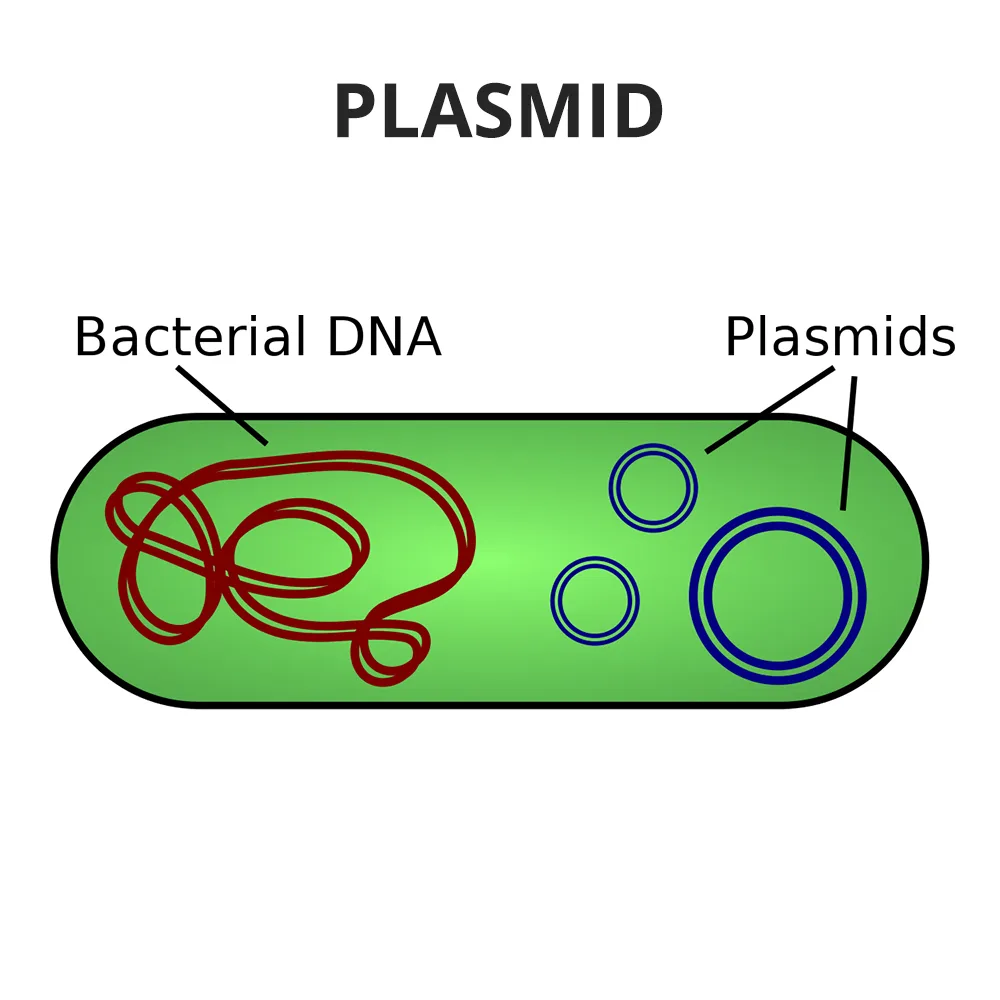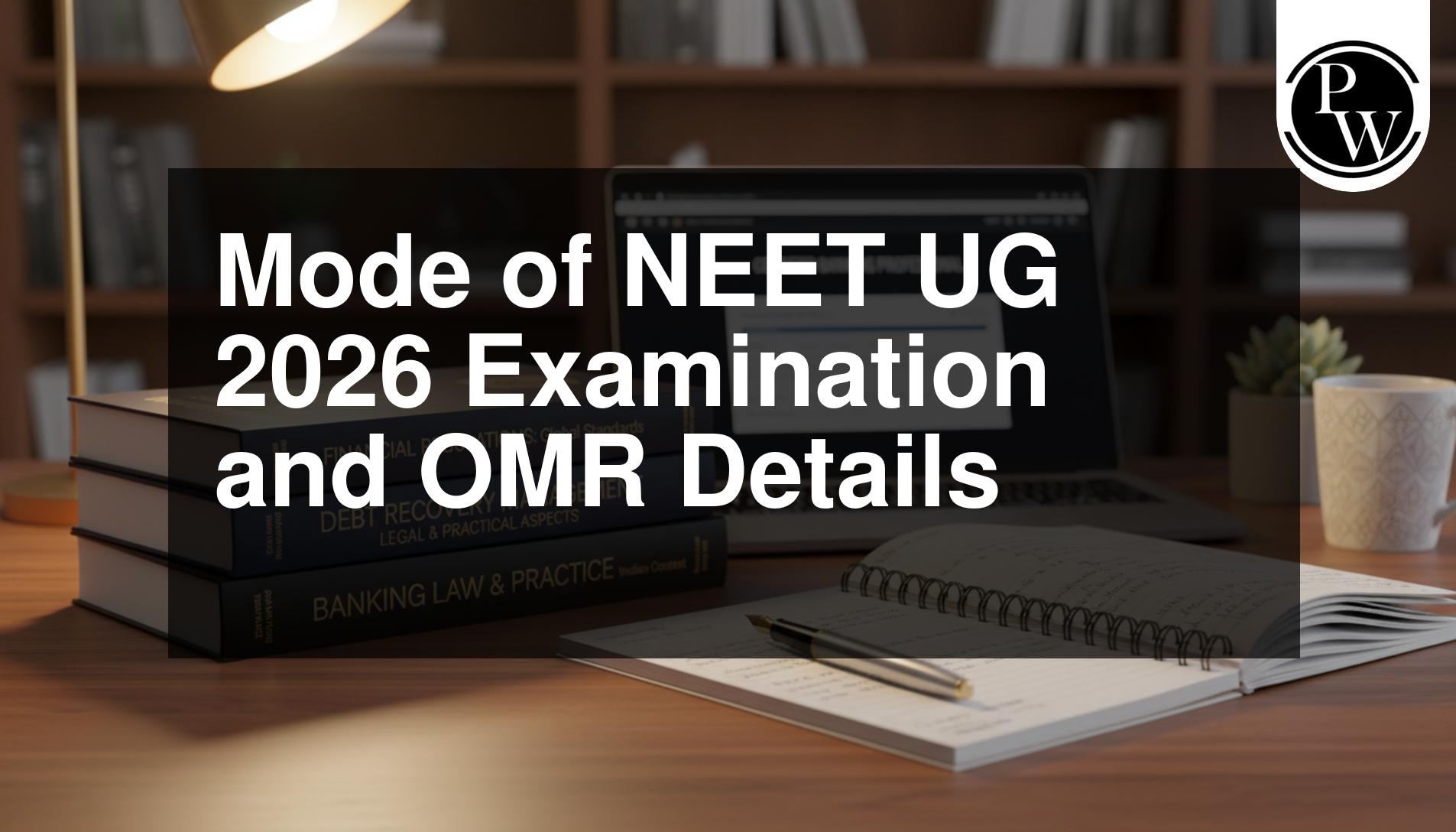
Plasmid: A plasmid is a small, circular, double-stranded DNA molecule distinct from a cell's chromosomal DNA. Plasmids naturally occur in bacterial cells and are also found in some eukaryotes. These genetic structures often carry genes that provide bacteria with specific advantages, such as antibiotic resistance. Plasmids vary in size, ranging from approximately one thousand to hundreds of thousands of DNA base pairs. During cell division, plasmids are replicated so that each daughter cell receives a copy.
Scientists utilize plasmids as tools for cloning, transferring, and manipulating genes. Plasmids used for experimental purposes are referred to as vectors. Researchers can insert DNA fragments or genes into a plasmid vector, creating a recombinant plasmid. This modified plasmid can be introduced into a bacterium through transformation. Due to the rapid reproduction of bacteria, they serve as efficient systems for replicating DNA fragments on a large scale. Below are detailed NEET Biology notes on plasmids, including their structure and functions.
What is Plasmid?
Plasmids are genetic structures present in certain prokaryotic cells like bacteria, and some eukaryotic cells such as plants and fungi. They are notably common in bacteria and archaea. Plasmids are extrachromosomal DNA, meaning they are not part of the chromosome and can replicate independently. They consist of a small, circular DNA strand located in a bacterium's cytoplasm. Plasmids are also described as additional circular, double-stranded DNA molecules distinct from chromosomal DNA. While bacteria can survive without plasmids, as all necessary genes are typically found on the chromosomal DNA, plasmids often carry at least one gene that provides an advantage to their host.Plasmid Structure
Plasmids are small, circular, double-stranded DNA molecules that exist separately from a cell's chromosomal DNA. While primarily found in bacteria, they can also be present in archaea and eukaryotes. Plasmids replicate autonomously from the chromosome and often carry genes that confer advantages to the host cell, such as antibiotic resistance or metabolising uncommon substances. A typical plasmid comprises several key components: Origin of replication (ori): A specific DNA sequence serving as the starting point for plasmid replication. Selectable marker genes: These genes enable the identification and selection of cells containing the plasmid. Common selectable markers provide resistance to antibiotics. Cloning site: An area where foreign DNA fragments can be inserted. Scientists utilize this site to introduce new genes into plasmids for experimentation. Other genes: Plasmids can harbor various genes that benefit the host cell, including those encoding enzymes for toxin breakdown, antibiotic production, or survival in harsh environments. Plasmid size can range from a few thousand to hundreds of thousands of base pairs, with the number of genes carried varying accordingly based on plasmid size and function.Types Of Plasmid
Plasmids are small, circular, extrachromosomal DNA molecules commonly found in bacteria, archaea, and some eukaryotes. They replicate independently of chromosomal DNA and can be transferred between organisms. Plasmids provide bacteria with various beneficial genes. There are different types of plasmids:- Resistance Plasmids (R plasmids): These plasmids carry genes that provide resistance to antibiotics, disinfectants, and other harmful substances. The spread of resistance plasmids is a major concern in public health.
- Virulence Plasmids: These plasmids contain genes that increase the pathogenicity of bacteria. They may encode toxins or proteins that help bacteria adhere to host cells.
- Degradative Plasmids: These plasmids carry genes that encode enzymes allowing bacteria to degrade unusual compounds, such as pollutants or pesticides.
- Col Plasmids: Col plasmids carry genes that encode bacteriocins, proteins that kill other bacteria, giving the host bacteria a competitive advantage.
- Fertility F Plasmids (F plasmids): These plasmids carry genes involved in bacterial conjugation, allowing bacteria to transfer genetic material to each other.
Plasmid Characteristics
The following are the key characteristics of plasmids:- Extrachromosomal Nature: Plasmids are small, circular DNA molecules that exist outside the bacterium's chromosomal DNA. They are not part of the bacterium's essential genetic material.
- Independent Replication: Plasmids can replicate independently of the chromosomal DNA. They possess their own origin of replication (ori) which initiates the replication process.
- Small Size: Plasmids are considerably smaller than chromosomal DNA, typically ranging from 1,000 to 200,000 base pairs in length. In contrast, chromosomes can be millions or even billions of base pairs long.
- Carriage of Genes: Plasmids often carry genes that provide advantageous traits to the host bacterium. These genes can code for functions such as antibiotic resistance, toxin production, or the ability to metabolize unusual compounds.
- Transferability: Plasmids can be transferred from one bacterium to another through conjugation, enabling bacteria to share genes and potentially acquire new characteristics.
- Variable Copy Number: The number of copies of a plasmid within a bacterial cell can vary. Some plasmids exist in low copy numbers (one or two copies per cell), while others can exist in high copy numbers (hundreds or even thousands of copies per cell).
Plasmid Function
Plasmids are small, circular, extrachromosomal DNA molecules commonly found in bacteria, and to a lesser extent in some archaea and eukaryotes. These molecules replicate independently of the chromosomal DNA and often carry genes that confer benefits to the organism, such as antibiotic resistance, the capacity to metabolize unusual food sources, or the production of toxins. The following are the functions of plasmids:- Antibiotic Resistance: Plasmids frequently contain genes that provide resistance to antibiotics. These genes may encode enzymes that break down antibiotics or modify bacterial cell walls to prevent antibiotic entry.
- Environmental Adaptation: Plasmids can help bacteria survive in harsh conditions, such as extreme temperatures, high salt concentrations, or exposure to toxic substances. Some plasmids carry genes encoding enzymes that detoxify heavy metals.
- Reproductive Functions: Certain plasmids contain genes involved in bacterial reproduction, including those that regulate conjugation, the process of genetic material transfer between bacteria.
- Virulence: Virulence plasmids encode genes that contribute to bacterial pathogenicity, enabling them to cause disease. These plasmids may contain genes encoding toxins or proteins that aid in the adherence of bacteria to host cells.
Plasmid Examples
Plasmids are small, circular DNA molecules found in bacteria that play a significant role in genetic engineering and biotechnology. They can replicate independently of the bacterial chromosome and often carry genes that provide bacteria with various advantages, such as antibiotic resistance or the ability to produce certain proteins. Here are some examples of plasmids and their functions:- pUC19: This is a commonly used cloning vector in molecular biology. It carries genes for ampicillin resistance and the enzyme beta-galactosidase, which allows for the easy selection and identification of transformed bacteria.
- pBR322: Another widely used cloning vector, pBR322 carries genes for resistance to ampicillin and tetracycline. It also contains a multiple cloning site (MCS) that allows for the insertion of DNA fragments for cloning.
- pGLO: This plasmid is used in biotechnology to study gene expression. It carries the gene for green fluorescent protein (GFP), which can be easily visualised under UV light when expressed in bacteria.
- Ti plasmid: Found in the soil bacterium *Agrobacterium tumefaciens*, the Ti plasmid is responsible for causing crown gall disease in plants. It carries genes that allow the bacterium to transfer a portion of the plasmid (T-DNA) into the plant's genome, leading to the formation of tumours.
- R plasmids: These plasmids carry genes that confer resistance to antibiotics. They can be transferred between bacteria, leading to the spread of antibiotic resistance genes.
- ColE1: A high-copy-number plasmid commonly used for the expression of recombinant proteins in bacteria. It replicates quickly and efficiently, allowing for the production of large amounts of protein.
Sexual Reproduction In Flowering Plants
Plasmid Vector
A plasmid vector is a DNA molecule used to transport foreign DNA into a host cell, typically a bacterium, for various purposes in genetic engineering and biotechnology. These vectors are crucial tools that enable scientists to introduce, replicate, and express genes of interest in host cells. Here are some key characteristics and functions of plasmid vectors:- Origin of replication (ori): Plasmid vectors possess an origin of replication, which is a specific DNA sequence enabling the plasmid to replicate independently from the host cell's chromosome. This ensures the replication of the foreign DNA carried by the plasmid when the host cell divides.
- Selectable markers: Plasmid vectors often contain genes that provide resistance to antibiotics, such as ampicillin or kanamycin. These markers facilitate the selection of cells that have incorporated the plasmid, as only those cells survive in the presence of the antibiotic.
- Multiple cloning site (MCS): The MCS is a segment of the plasmid vector containing various unique recognition sites for restriction enzymes. These sites allow for the straightforward insertion of foreign DNA into the plasmid using restriction enzymes and DNA ligase.
- Promoter and reporter genes: Plasmid vectors may include a promoter region, which is a DNA sequence initiating the transcription of the inserted gene. Additionally, they may carry reporter genes, such as the green fluorescent protein (GFP) gene, enabling the visual detection of gene expression in the host cell.
- Size and copy number: Plasmid vectors come in different sizes and copy numbers. Some are high-copy-number vectors, meaning they replicate extensively within the host cell, while others are low-copy-number vectors, replicating at a lower rate. The choice of vector depends on the specific application and experimental requirements.
Plasmid Uses
Plasmids are small, circular DNA molecules that are commonly found in bacteria and other microorganisms. They exist independently from the organism's chromosomal DNA and have the ability to replicate autonomously. Plasmids are highly utilised in various fields such as research, biotechnology, and medicine due to their capacity to carry genes and replicate within a host cell. Some key applications of plasmids include:- Gene Cloning
- Gene Expression Studies
- Creation of Genetically Modified Organisms (GMOs)
- Production of Recombinant Proteins
- Studies on Drug Resistance
- Gene Therapy
| NEET Exam Important Links | |
|---|---|
| NEET Syllabus | NEET Biology Diagrams |
| NEET Biology MCQ | NEET Biology Chapter wise Weightage |
| NEET Biology Notes | NEET Previous Year Question papers |
Plasmid FAQs
Is pBR322 a plasmid?
pBR322 DNA is a commonly used plasmid cloning vector in E. coli
Which plasmid vector?
The foremost example of plasmid vectors that utilize the lacZ gene as a marker/reporter is the pUC series vectors.
What is plasmid and its function?
Plasmids are small, circular DNA molecules found in bacterial and some eukaryotic cells. They often carry genes that give bacteria advantages, like antibiotic resistance.
What does 322 mean in pBR322?
pBR322, a plasmid used for E. coli cloning, stands for plasmid, Bolivar, and Rodriguez. The number 322 distinguishes it from other lab-synthesized plasmids.
What are two examples of plasmid vector?
Virulence plasmid makes bacteria pathogenic. Many plasmid vectors are artificially created and widely used in genetic engineering.
Talk to a counsellorHave doubts? Our support team will be happy to assist you!

Free Learning Resources
PW Books
Notes (Class 10-12)
PW Study Materials
Notes (Class 6-9)
Ncert Solutions
Govt Exams
Class 6th to 12th Online Courses
Govt Job Exams Courses
UPSC Coaching
Defence Exam Coaching
Gate Exam Coaching
Other Exams
Know about Physics Wallah
Physics Wallah is an Indian edtech platform that provides accessible & comprehensive learning experiences to students from Class 6th to postgraduate level. We also provide extensive NCERT solutions, sample paper, NEET, JEE Mains, BITSAT previous year papers & more such resources to students. Physics Wallah also caters to over 3.5 million registered students and over 78 lakh+ Youtube subscribers with 4.8 rating on its app.
We Stand Out because
We provide students with intensive courses with India’s qualified & experienced faculties & mentors. PW strives to make the learning experience comprehensive and accessible for students of all sections of society. We believe in empowering every single student who couldn't dream of a good career in engineering and medical field earlier.
Our Key Focus Areas
Physics Wallah's main focus is to make the learning experience as economical as possible for all students. With our affordable courses like Lakshya, Udaan and Arjuna and many others, we have been able to provide a platform for lakhs of aspirants. From providing Chemistry, Maths, Physics formula to giving e-books of eminent authors like RD Sharma, RS Aggarwal and Lakhmir Singh, PW focuses on every single student's need for preparation.
What Makes Us Different
Physics Wallah strives to develop a comprehensive pedagogical structure for students, where they get a state-of-the-art learning experience with study material and resources. Apart from catering students preparing for JEE Mains and NEET, PW also provides study material for each state board like Uttar Pradesh, Bihar, and others
Copyright © 2026 Physicswallah Limited All rights reserved.









